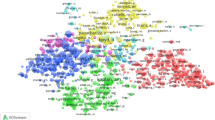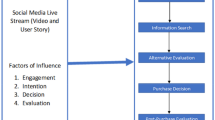Abstract
The present study focused on one of the new mass media technologies, weblogs, which allow more tourists to construct an expressive self by posting their writings about their travel experiences. The current research examined the meanings represented in the personal travel experiences and how self-identity is constructed in the touristic discourse. Utilizing critical discourse analysis (CDA), the travel blogs posted by Chinese tourists about their experiences of visiting a Chinese minority group—the matriarchal Mosuo—were analyzed. Among 69 blogs, four major topics were located. The study identified the fragmented, fluid, and flexible nature of self-identity constructed in the postmodern social conditions.

Similar content being viewed by others
References
Abram S, Waldren J, Macleod D (1997) Tourists and tourism: identifying with people and places. Berg, Oxford
Anderson B (1991) Imagined communities: reflections on the origin and spread of nationalism. Verso, London
Anderson H (1997) Self: narrative, identity, and agency. In: Anderson’s conversations, language and possibilities (Chp. 10). Basic Books, New York
Baker C (2004) Membership categorization and interview accounts. In: Silverman D (ed) Qualitative research: Theory, method, and practice. Sage, London, UK, pp 162–176
Bamberg M (2010) Who am I? Narration and its contribution to self and identity. Theory Psychol 21(1):1–22
Bandyopadhyay R, Morais DB (2005) Representative dissonance: India’s self and western representations. Ann Tour Res 32(4):1006–1021
Bauman Z (1987) Legislators and interpreters. Polity Press, Cambridge
Bhabha H (1994) The location of culture. Routledge, New York
Blogger (2006) Lugu Hu Qingge (love songs in Lugu Lake). http://www.yoyoucn.cn/blog/archives/279.html
Blood R (2002) Weblogs: a history and perspective. In: Publishing P (ed) We’ve got blog: how weblogs are changing our culture. Perseus Publishing, Cambridge, pp 7–16
Bruner EM (1991) Transformation of the self in tourism. Ann Tour Res 18:238–250
Bryant J, Lasky B (2007) A researcher’s tale: dealing with epistemological divergence. Qual Res Organ Manag Int J 2(3):179–193
Buhalis D (2003) ETouism: information technology for strategic tourism management. Prentice Hall, London
Buzinde CN, Santos CA (2008) Representations of slavery. Ann Tour Res 35(2):469–488
Chao E (1996) Hegemony, agency, and re-presenting the past. In: Brown MJ (ed) Negotiating ethnicities in China and Taiwan, Institute of East Asian Studies. University of California, Berkeley, pp 208–239
China Internet Network Information Center (2006) Zhongguo boke baogao (2006 Report of Weblog in China). http://www.cnnic.cn/uploadfiles/pdf/2006/9/28/182836.pdf
Chouliaraki L, Fairclough N (1999) Discourse in late modernity: rethinking critical discourse analysis. Edinburgh University Press, Edinburgh
Clear Sky (2008) Lugu hu (Lugu Lake). http://www.yododo.com/blog/011AFC84E8541005FF8080811AFA27CC
Conhaim WW (2003) Personal journals: new uses for an age-old practice. Inf Today 20(1):27–34
Dann G (1996) The language of tourism: a sociolinguistic perspective. Cab International, Oxon
Dann G (1999) Writing out the tourist in space and time. Ann Tour Res 26(1):159–187
Denzin N (1991) Images of postmodern society: Social theory and contemporary cinema. Sage Publications Ltd., London
Denzin NK, Lincoln YS (2011) Handbook of qualitative research. Sage Publications Inc., Thousand Oaks
Desforges L (2000) Traveling the world: identity and travel biography. Ann Tour Res 27(4):926–945
Echtner C, Prasad P (2003) The context of third world tourism marketing. Ann Tour Res 30(3):660–682
Elbow P (1999) In defense of private writing: consequences for theory and research. Writ Commun 16(2):139–170
Elsrud T (2004) Taking time and making journeys: narrative on self and the other. Dissertation, Sweden Lund University
Fairclough N (1995) Critical discourse analysis: the critical study of language. Longman, London
Fairclough N (2001) Language and power. Longman, Harlow
Fairclough N, Wodak R (1997) Critical discourse analysis. In: Van Dijik TA (ed) Discourse studies: a multidisciplinary introduction: discourse as a social interaction. Sage Publications Ltd., London, pp 258–284
Flax J (1990) Thinking fragments: psychoanalysis, feminism, and postmodernism in the contemporary west. University of California Press, Los Angeles
Foucault M (1969) The archaeology of knowledge. Pantheon Books, New York
Foucault M (1988) Technologies of the Self. In: Martin LH, Gutman H, Hutton PH (eds) Technologies of the self: a seminar with Michel Foucault. Univesity of Massachusetts Press, Amherst, pp 16–49
Four Three Two One (2007) Lugu hu hushui haizai nali (the water of Lugu Lake is still in there). http://www.yododo.com/blog/011A151F69E709DBFF8080811A12620F?pager.offset=20#comments
Frazer N (1989) Talking about needs: interpretive contests as political conflicts in welfare-state societies. Ethics 99:291–313
Galani-Moutafi V (2000) The self and the other: traveler, ethnographer, tourist. Ann Tour Res 27(1):203–224
Gergen K (1994) Realities and relationships: sounding in social construction. Harvard University Press, Cambridge
Giddens A (1991) Modernity and self-identity: self and society in late-modernity. Polity Press, Cambridge
Gu C, Shen J (2003) Transformation of urban social-spatial structure in socialist market economies: the case of Beijing. Habitat Int 27:107–122
Hall S (2005) Introduction: who needs ‘identity’? In: Hall S, Du Gay P (eds) Questions of cultural identity. Sage Publications Ltd., London, pp 1–17
Harvey D (1990) The condition of postmodernity: an enquiry into the origins of cultural change. Blackwell Publishers, Cambridge
He ZH (2000) Shengcun he wenhua de xuanze: Mosuo muxizhi jiqi xiandai bianqian (the choice between survival and culture: the Mosuo matriarchal/matrilineal system and contemporary change). Yunnan chubanshe, Kunming
He C, Tian J, Shi P, Hu D (2011) Simulation of the spatial stress due to urban expansion on the wetlands in Beijing, China using a GIS-based assessment model. Landsc Urban Plan 101:269–277
Hollinshead K (2002) Playing with the past: heritage tourism under the tyrannies of postmodern discourse. In: Ryan C (ed) The tourist experience. Continuum, London, pp 172–200
Katz J (2002) Here come the weblogs. In: Publishing P (ed) We’ve got blog: how weblogs are changing our culture. Perseus Publishing, Cambridge, pp 17–24
Kellner D (1992) Popular culture and the construction of postmodern identities. In: Lash S, Friedman J (eds) Modernity and identity. Blackwell, Oxford, pp 141–177
Kohn T (1997) Island involement and the emerging tourist. In: Abram S, Walden J, Macleod D (eds) Tourist and tourism: identifying with people and places. Berg, Oxford, pp 13–28
Lather P (1991) Getting smart: feminist research and pedagogy with/in the postmodern. Sage Publications Ltd., London
Leong WT (1997) Culture and the state: manufacturing traditions for tourism. In: Ong JT, Tong CK, Tan ES (eds) Understanding Singapore society. Times Academic Press, Singapore, pp 513–534
Lin N, Lai G (1995) Urban stress in China. Soc Sci Med 41(8):1131–1145
Lucky Star (2007) Meili shenqi de lugu hu zhixing (the trip to the beautiful and mysterious Lugu Lake). http://www.soobb.com/Destination_Item_Web_96858.html
Lyotard JF (1984) The postmodern condition: a report on knowledge (Bennington G and Massumi B, Trans.). University of Minnesota Press, Minneapolis
Mathieu C (2000) Myths of matriarchy: the Mosuo and the kingdom of women. In: Brewer C, Medcalf AM (eds) Researching the fragments: histories of women in the Asian context. New Day, Manila, pp 177–197
Mathieu C (2003) A history and anthropological study of the ancient kingdoms of the Sino-Tibetan borderland—Naxi and Mosuo. Edwin Mellen, Lewiston
Miller C, Shepherd D (2004) Blogging as social action: a genre analysis of the weblog. Retrieved on 18 March 2014 from http://blog.lib.umn.edu/blogosphere/blogging_as_social_action_a_genre_analysis_of_the_weblog.html
Mowforth A, Munt I (1998) Tourism and sustainability: new tourism in the third world. Routledge, London
Ning Lang County Tourism Bureau (2008) Ninglang yizu zizhixian luyouju 2003–2007 gongzuo zongjie (conclusion for the work in Ninglang county and Yi nationality autonomous region between 2003 and 2007). http://lj.xxgk.yn.gov.cn/canton_model1/newsview.aspx?id=68813
Noy C (2004) This trip really changed me: backpackers’ narratives of self-change. Ann Tour Res 31(1):78–102
One Day (2006) Lugu hu (Lugu Lake). http://blog.3608.com/article/7044.html
Palmer C (2005) An ethnography of englishness: experiencing identity through tourism. Ann Tour Res 32(1):7–27
Papaya (2008) Lijiang lugu hu de geyao (Ballad in Lijiang and Lugu Lake). http://lijiangcits.blogbus.com/logs/24272649.html
Pritchard A, Morgan NJ (2001) Culture, identity and tourism representation: marketing Cymru or Wales? Tour Manag 22:167–179
Pudliner AB (2007) Alternative literature and tourist experience: travel and tourist weblogs. J Tour Cult Change 5(1):46–59
Robinson M, Anderson HC (2002) Literature and tourism: essays in the reading and writing of tourism. Thomson Learning, London
Rose G (2001) Visual methodologies. Sage Publication Ltd., Thousand Oaks
Ryan C (2002) Stages, gazes and constructions of tourism. In: Ryan C (ed) The tourist experience. Continuum, London, pp 1–26
Said E (1979) Orientalism. Vintage Books, New York
Sanyadentist (2007) Xingzou lugu hu (walking at Lugu Lake). http://www.yododo.com/blog/011B4A473D8B06DBFF8080811B49829F
Schein L (1997) Gender and internal orientalism in China. Mod China 23(1):69–98
Shih CK (2001) Genesis of marriage among the Moso. J Asian Stud 60(2):381–412
Shih CK, Jenike MR (2002) A cultural–historical perspective on the depressed fertility among the matrilineal Mosuo in southwest China. Hum Ecol 30(1):21–47
Smith V (1978) Hosts and guests: the anthropology of tourism. Basil Blackwell, Oxford
Sofield THB, Li FMS (1998) Tourism development and cultural policies in China. Ann Tour Res 25(2):362–392
Towner J (1985) The grand tour: a key phase in the history of tourism. Ann Tour Res 12:197–333
Uriely N (1997) Theories of modern and postmodern tourism. Ann Tour Res 24:982–985
Uriely N (2005) The tourist experience: conceptural development. Ann Tour Res 32(1):199–216
Urry J (1990) The tourist gaze: leisure and travel in contemporary societies. Sage Publications Ltd, London
Urry J (1995) Consuming places. Routledge, London
Urry J (2002) Tourist gaze. Sage Publications Ltd., London
Van Dijk TA (2002) Ideology: political discourse and cognition. In: Chilton P, Schaffner CH (eds) Politics as text and talk. Benjamins, Amsterdam, pp 33–57
Wagner P (1994) A sociology of modernity: liberty and discipline. Routledge, London
Walsh ER (2001) Living with the myth of matriarchy: the Mosuo and tourism. In: Tan CB, Cheung CHS, Yang H (eds) Tourism, anthropology and China: in memory of Professor Wang Zhusheng. White Lotus, Bangkok, pp 93–124
Walsh ER (2003) The Na. In: Ember CR, Ember M (eds) Encyclopedia of sex and gender: Men and women in the world’s cultures. Kluwer Academic/Plenum, New York, pp 697–707
Walsh ER (2005) ‘From N Guo to N’er Guo: negotiating Desire in the Land of the Mosuo. Mod China 31(4):448–486
Weedon C (1997) Feminist practice and poststructuralist theory, 2nd edn. Blackwell, Malden
Yan R, Song Z (1983) Yongning naxizu de muxizhi (the matriarchal system of the Naxi nationality of Yongning), Yunnan Renmin Chubanshe
Yunnan tourism (2008) Lugu hu: Wo de meng (Lugu Lake: my dream). http://www.ynxing.com/ljly/ljly_6671.html
Zhang K (1990) Family marriage and fertility in a matriarchal society: social survey of the Naxi nationality in Ninglang County, Yunnan Province. Chin J Pop Sci 2(3):247–256
Author information
Authors and Affiliations
Corresponding author
Rights and permissions
About this article
Cite this article
Wang, Y., Morais, D.B. An examination of tourists’ identity in tourist weblogs. Inf Technol Tourism 14, 239–260 (2014). https://doi.org/10.1007/s40558-014-0016-6
Received:
Revised:
Accepted:
Published:
Issue Date:
DOI: https://doi.org/10.1007/s40558-014-0016-6




